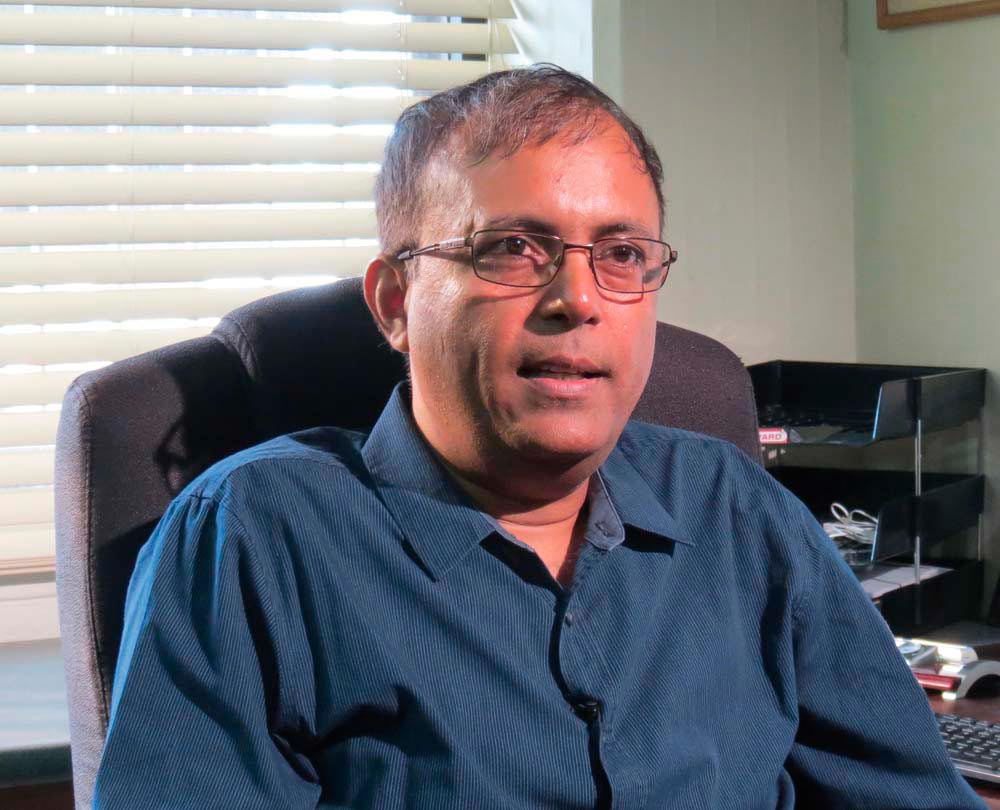“The microbial biodiversity of Caribbean soils can be tens of thousands of times greater than temperate soils,” says Adesh Ramsubhag, a microbiologist at the University of the West Indies campus in St Augustine, Trinidad. The implications are enormous, even if they don’t seem that way at first. Many of these microbes have unique genes that result in their production of “novel metabolic compounds.” And those compounds have potentially major useful applications.
Such as reversing the worldwide attenuation of antibiotics. Ramsubhag (and his graduate students) have uncovered one compound which will do just that. It is now being patented, and once that process is complete, he says, “This could be a game-changer, with the potential of saving many lives and bringing in significant economic benefits to the country.” Other possibilities include compounds which can clean up oil spills, improve crop yields, and have other medical applications — all of which Ramsubhag and his collaborators at UWI are working on.
These may seem like astounding revelations, and they are. But the question arises: why are they only now being revealed? The answer is that they’re not. That the Caribbean’s biodiversity is greater than that of temperate climates is well known. The Imperial College of Tropical Agriculture, founded in 1921, was the institution that preceded and eventually became the nucleus of UWI’s St Augustine campus, and significant research was carried out, and discoveries were made, from the mid-twentieth century onwards, but there’s been little continuity.
Today, many foreign pharmaceutical companies come to the Caribbean for “bio-prospecting” and take samples back to metropolitan labs for research. However, Ramsubhag says, we haven’t developed our own research infrastructure in the English-speaking Caribbean to harness the potential of our biodiversity. The story is different in another Caribbean country which has moved to exploit the natural potential of its bio-resources. Cuba, one of the largest manufacturers of pharmaceuticals in the world, is a leading global centre for bio-medical research.
If Trinidad and Tobago seems lethargic about this area of scientific inquiry, one reason is the country’s oil and gas industry, which has dominated the island’s economy and academic attention for the last half-century. The ongoing change to renewable energy technologies that rely on alternatives to fossil fuels has stunned the country, which is now in the throes of economic trauma. The movement of resources into bio-prospecting might seem natural and logical, but it hasn’t been the case. The country spends more money on its annual Carnival than on scientific research.
“In today’s world, we have the advent of the knowledge-based economy, and all progressive countries allocate a significant amount of resources to support research and innovation, in some cases greater than four per cent GDP,” says Ramsubhag. “Individual researchers and laboratories in these countries would typically have access to millions of US dollars to support their activities. Here, we have no national funding programme to support research and are entirely dependent on university grants, which are very limited. If we could get about [TT] $5 million per year, we could make a major impact in ten years.”
This “failure to diversify” has plagued the T&T economy since Independence in 1962, and Ramsubhag was aware of the dynamic of underdevelopment before he entered academia. He grew up on a farm with his parents and siblings in south Trinidad, and in his early twenties had settled into a career as a farmer. He decided to enroll at UWI to pursue a degree in agriculture, and there he discovered his affection for science. His aptitude was recognised and encouraged by some faculty members, and today he still visits the farm run by his relatives, but his business is in a lab.
After he completed his PhD in microbiology in 1998, Ramsubhag worked with the Caribbean Industrial Research Institute (CARIRI), where he applied his scientific knowledge to practical issues facing both the private and governmental sectors — like quality control in industrial and manufacturing plants, and environmental issues. Once he joined the university, he was instrumental in developing microbiology as a discipline in the Faculty of Science and Technology, and his students credit his generosity and guidance in bringing their projects to fruition. “His PhD in 1998 started a new wave in Trinidad and Tobago,” says Ramsubhag’s colleague Professor Pathmanathan Umaharan, “of taking a molecular biological approach to studying microorganisms which were largely studied microscopically or biochemically.” Ramsubhag has since collaborated across the university with food production, medical sciences, veterinary medicine, and engineering.
Talking to Ramsubhag, you hardly get the impression of a colossus straddling and uniting many different sub-disciplines of science. Face to face, he’s a shy, unassuming man who talks passionately about his research, but is reticent about taking too much credit, and sharing generously with his students and collaborators. He credits his academic aptitude to the respect for knowledge and education he acquired at home. His eight brothers and sisters were all older than he was, and he listened to them talking about their school work around the dinner table, which inspired him to take his own studies more seriously.
In many ways, he says, his story is instructive for students and policy makers. At his secondary school in south Trinidad, he was guided into an arts stream for advanced level studies, which did not interest him. He was an unenthusiastic student because he wasn’t exposed to the subject areas which stimulated him. It wasn’t until later in life that he found his passion, which many people never do.
In 2018, Ramsubhag was named the Anthony N. Sabga Caribbean Awards for Excellence Laureate in Science and Technology. In his acceptance speech at the ceremony in Jamaica, he acknowledged again the influence of family and community in creating and shaping him. He also pointed to a path which might be the Caribbean’s salvation: the pursuit of science. “I strongly believe science and technology can be significant sources of social and economic development in the Caribbean. But there is critical need for more funding of science-based programmes in the region.”




















